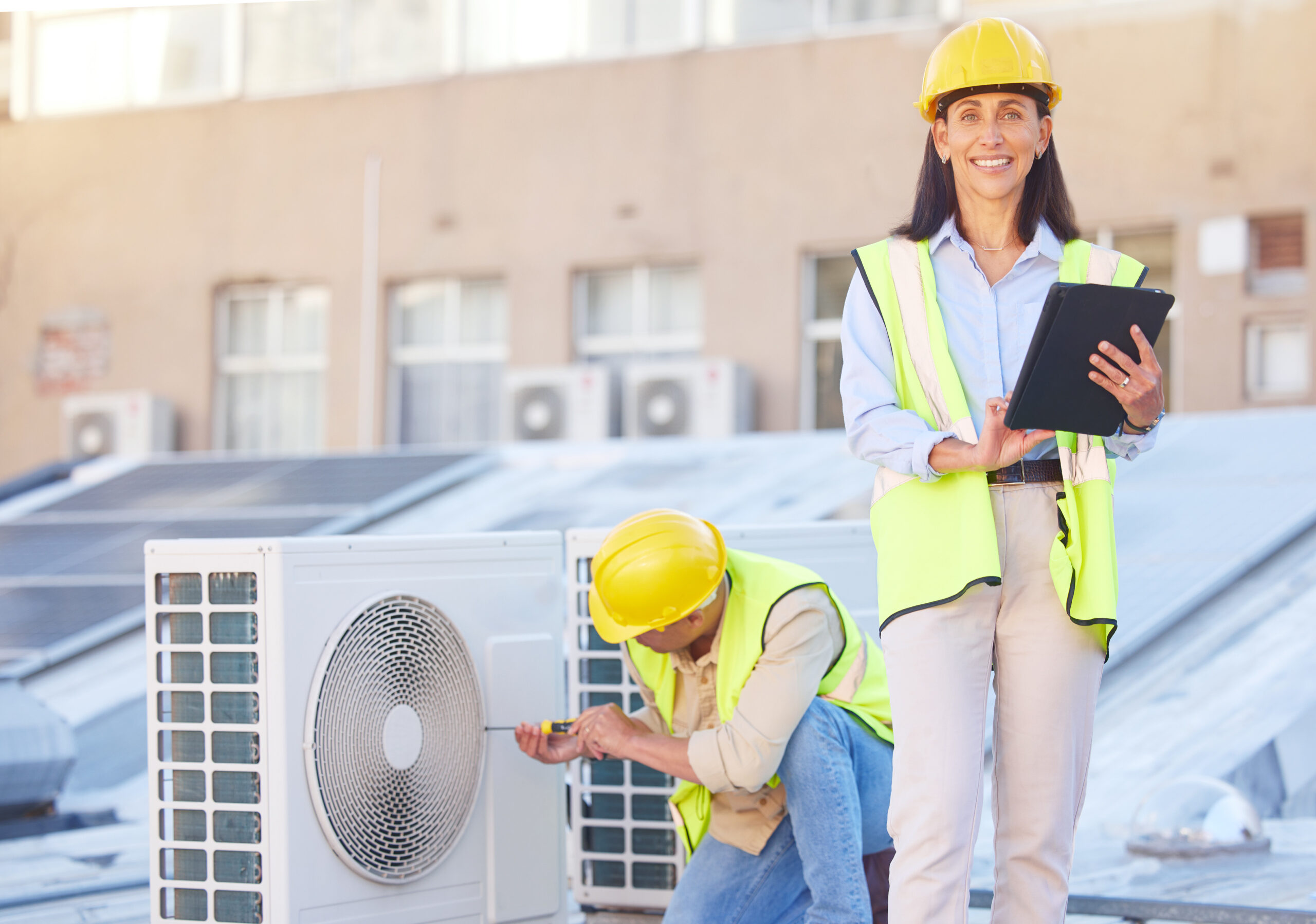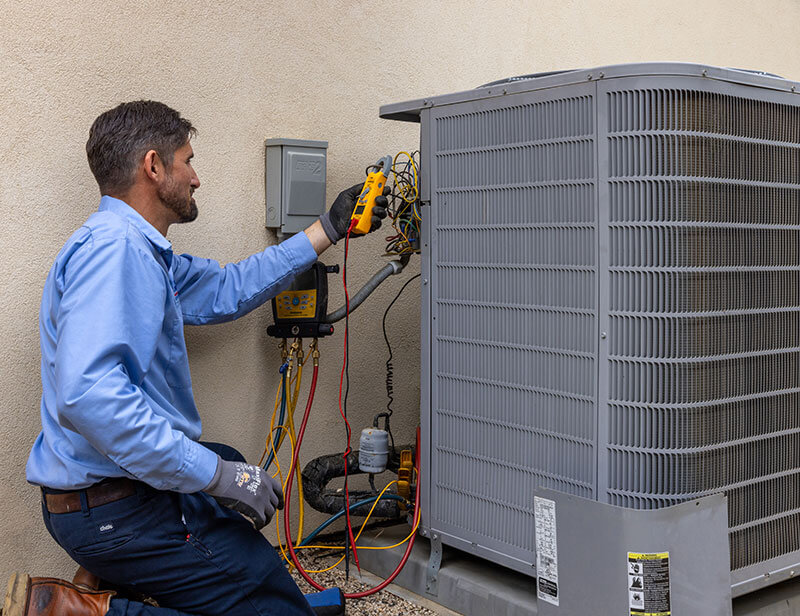heat pump service: What It Includes and Why It Matters
heat pump service: What It Includes and Why It Matters
Blog Article
Selecting In Between a Heatpump and Furnace: Secret Factors To Consider for Your Cooling And Heating Demands
When reviewing home heating choices for a/c needs, the decision between a heatpump and a heating system can be complex. Each system provides distinctive advantages tailored to particular climates and power efficiency objectives. Understanding these differences is important for making an informed selection. Key elements such as installment prices and environmental impact better make complex the choice procedure. Which alternative genuinely straightens with one's comfort and sustainability choices? The complying with sections will check out these factors to consider thoroughly.
Comprehending Heat Pumps: Exactly How They Work and Their Benefits
While several homeowners consider different home heating alternatives, understanding how heatpump feature and their advantages can significantly affect their decision. Heatpump operate by transferring heat instead than producing it. In the winter months, they extract warm from the outdoors air or ground and move it inside, while in the summer, they reverse this procedure, cooling down the home by getting rid of warm outside. This dual capability makes them flexible for year-round environment control.One of the primary advantages of heat pumps is their power efficiency. They utilize considerably much less electricity compared to standard heater, possibly resulting in lower energy bills (heat pump service). Additionally, heatpump have a smaller carbon footprint, making them an eco-friendly option. They also need less upkeep than traditional systems, adding to long-term expense financial savings. In general, comprehending the mechanics and benefits of warmth pumps can help home owners make informed choices concerning their heating and cooling requirements
Exploring Heating Systems: Kinds, Operation, and Benefits
Heating systems can be found in various types, including gas, electrical, and oil designs, each with distinctive functional systems. Understanding these differences is vital, as they affect efficiency and home heating performance. Furthermore, heaters use countless benefits, such as regular heat output and reliability in cooler climates.
Kinds of Furnaces
Heater can vary significantly in design and operation, with heating systems being a prominent choice amongst house owners. There are a number of sorts of heaters, each utilizing different gas resources and technologies. Gas heating systems prevail, leveraging gas to create heat efficiently. Electric heating systems, on the various other hand, utilize electric resistance to create warmth, commonly preferred for their simple setup. Oil furnaces, while much less common, work in locations with limited gas gain access to (ductless mini splits). Additionally, condensing heating systems make the most of energy effectiveness by reusing and catching exhaust gases. Each kind operates with a system of warmth exchangers and ductwork to disperse cozy air throughout a home. Understanding the distinctions between these heater types is essential for notified heating and cooling decisions
Advantages of Heating systems
For property owners looking for reliable heat throughout chilly months, the advantages of furnaces are significant. Heating systems offer constant home heating, guaranteeing even temperature levels throughout the home. They are specifically reliable in extreme cold, usually outperforming heat pumps in icy problems. Various types, consisting of gas, electric, and oil heating systems, provide flexibility to fulfill varied requirements and preferences.Furnaces likewise tend to have reduced initial setup prices compared to warm pumps, making them an extra easily accessible choice for numerous. Their robust style adds to a longer lifespan, with numerous devices lasting over 15 years with correct maintenance. Furthermore, modern heaters are often furnished with innovative technology for enhanced efficiency, which can lead to decreased power costs. Overall, heaters continue to be a reputable option for efficient home heating.

Power Effectiveness: Contrasting Heat Pumps and Furnaces
When comparing energy effectiveness in between warm pumps and heaters, the Seasonal Power Effectiveness Ratio (SEER) plays a vital duty in establishing efficiency. In addition, an operational cost analysis reveals the lasting financial effects of each system. Recognizing these variables can direct house owners in making informed choices regarding their heating remedies.
Seasonal Power Performance Ratio
Energy effectiveness plays an important role in the decision-making process between heatpump and heaters, especially when thinking about the Seasonal Power Performance Ratio (SEER) This statistics steps the cooling performance of heat pumps over a whole cooling period, providing a standardized method to examine efficiency. Higher SEER ratings indicate higher power performance, equating to reduced power consumption and minimized energy bills. In contrast, furnaces are commonly examined utilizing the Annual Gas Use Performance (AFUE) rating, which mirrors home heating efficiency. When contrasting these 2 systems, home owners ought to focus on SEER rankings for heat pumps, as they directly effect general energy financial savings and ecological sustainability. A thorough understanding of SEER can notably influence the long-lasting contentment and cost-effectiveness of the selected HVAC option.
Functional Price Evaluation
Understanding the functional prices associated with heatpump and furnaces is crucial for homeowners reviewing their choices. Heatpump usually use greater power efficiency, transforming electric power right into warm with minimal waste. This causes lower regular monthly utility costs, particularly in modest climates. On the other hand, standard heating systems, especially gas versions, may have lower in advance prices however can sustain greater operational expenditures over time as a result of fuel costs and efficiency ratings.Moreover, heat pumps can work as both heating and cooling down systems, possibly minimizing the demand for different cooling visit homepage and heating systems. While first financial investments for warmth pumps may be greater, their lasting financial savings in power efficiency can make them an extra cost-efficient selection for lots of families. Cautious evaluation of neighborhood energy prices is essential to identify the most effective option.
Setup Costs: What to Expect for Each Heater
Setup costs for heater can vary significantly between warm pumps and heaters, influencing property owners' choices. Heatpump normally have greater upfront installment costs, typically ranging from $3,500 to $8,000, relying on the system size and complexity of setup. This consists of the exterior device, indoor handling system, and necessary ductwork adjustments. On the other hand, furnaces have a tendency to have reduced initial expenses, balancing between $2,500 and $6,000, which can be appealing for budget-conscious house owners. Nonetheless, setup expenses can boost if comprehensive ductwork is required.Moreover, the selection of fuel kind for heating systems-- natural view it gas, gas, or electrical-- can additionally affect setup prices. While warmth pumps provide power efficiency, their first financial investment might hinder some customers. Inevitably, reviewing installation expenses along with long-lasting financial savings and effectiveness will assist home owners in making notified decisions concerning their heating systems.
Climate Factors To Consider: Which System Executes Much Better in Your Location
How do climate conditions affect the effectiveness of furnace? The performance of warm pumps and heaters can differ considerably relying on the regional climate. In modest environments, warmth pumps excel by efficiently transferring warmth from the outdoors air, making them an energy-saving choice. Nonetheless, their performance decreases in incredibly cold temperature levels, where they might have a hard time to draw out adequate warm. On the other hand, heating systems, especially gas designs, offer consistent and reliable warm despite exterior problems, making them preferable in cooler regions.In locations that experience milder winters months, heatpump can operate effectively year-round, providing both cooling and heating. On the other hand, regions with extreme winters months usually take advantage of the toughness of heaters. Eventually, comprehending the neighborhood climate is vital when deciding between a heatpump and a heater, as it directly influences their functional performance and general performance.
Upkeep Needs: Long-Term Take Care Of Warm Pumps vs. Furnaces
While both heatpump and furnaces require regular upkeep to assure peak efficiency, their specific demands and care regimens differ substantially. Furnaces commonly need less regular focus, with annual examinations being adequate to look for gas leaks, clean filters, and analyze general functionality. Their easier style often enables simple repairs.In comparison, heatpump require biannual maintenance due to their twin function in cooling and heating. This consists of cleaning coils, examining refrigerant internet levels, and making sure that both the outside and interior units operate at their best. In addition, warmth pump upkeep commonly entails even more intricate components, making specialist maintenance essential.Neglecting upkeep can cause lessened efficiency and boosted power prices for both systems. Ultimately, home owners ought to consider these long-lasting care demands when selecting in between a heatpump and a furnace, as proactive maintenance can expand the lifespan and efficiency of either system considerably.
Environmental Effect: Picking a Sustainable Home Heating Alternative
The environmental impact of furnace is an essential examination for house owners looking for lasting choices. Warm pumps are generally more energy-efficient than conventional heating systems, as they move heat instead of generate it, considerably lowering carbon exhausts. By making use of renewable resource resources, such as geothermal or air-source warm pumps, property owners can even more minimize their ecological footprint.On the other hand, all-natural gas heating systems discharge greenhouse gases and add to air pollution, though they frequently provide higher heat output. Advancements in modern technology have actually led to the development of high-efficiency heating systems that reduce emissions.Ultimately, choosing a home heating system involves evaluating efficiency against environmental influence. Home owners are urged to show on local power sources and motivations for sustainable systems, guaranteeing a selection that lines up with both personal convenience and ecological responsibility. The decision influences not only immediate convenience yet also lasting sustainability and environmental wellness.
Often Asked Questions
How Long Do Heat Pumps and Furnaces Generally Last?
The life-span of warm pumps typically varies from 15 to 20 years, while heating systems can last between 15 to three decades. Regular maintenance substantially impacts their long life and efficiency in providing home heating solutions.
Can I Utilize a Heatpump in Very Cold Climates?
Heatpump can run in extremely chilly climates, however their performance diminishes as temperature levels drop. In such conditions, extra home heating sources may be necessary to maintain comfy interior temperature levels and assure peak performance.

What Is the Noise Degree of Warmth Pumps Versus Furnaces?
The noise levels of warmth pumps and heaters differ significantly. Normally, heat pumps run even more quietly than traditional heaters, making them more effective for those delicate to seem, while furnaces might produce louder functional sounds during heating cycles.
Are Heat Pumps Suitable for Both Cooling And Heating?
Warm pumps are without a doubt suitable for both home heating and cooling (ductless mini splits). They operate by transferring warmth, offering effective temperature level control year-round, making them a functional choice for property owners looking for an all-in-one cooling and heating service
What Dimension Heating System Do I Required for My Home?
Identifying the ideal size furnace for a home requires reviewing elements such as square video, insulation high quality, neighborhood climate, and the home's design. Consulting a specialist can assure an accurate evaluation and ideal convenience. Heat pumps normally offer greater energy efficiency, converting electrical power into warm with marginal waste. In modest climates, warm pumps succeed by successfully transferring warmth from the outside air, making them an energy-saving alternative. Conversely, furnaces, especially gas designs, give consistent and reputable warm no matter of outside conditions, making them more suitable in chillier regions.In locations that experience milder wintertimes, warmth pumps can operate efficiently year-round, providing both heating and cooling. Warm pumps are usually more energy-efficient than traditional heating systems, as they move warmth instead than produce it, greatly reducing carbon emissions. By utilizing renewable energy sources, such as geothermal or air-source warmth pumps, property owners can additionally minimize their ecological footprint.On the various other hand, natural gas heaters give off greenhouse gases and contribute to air pollution, though they typically offer higher heat output.
Report this page